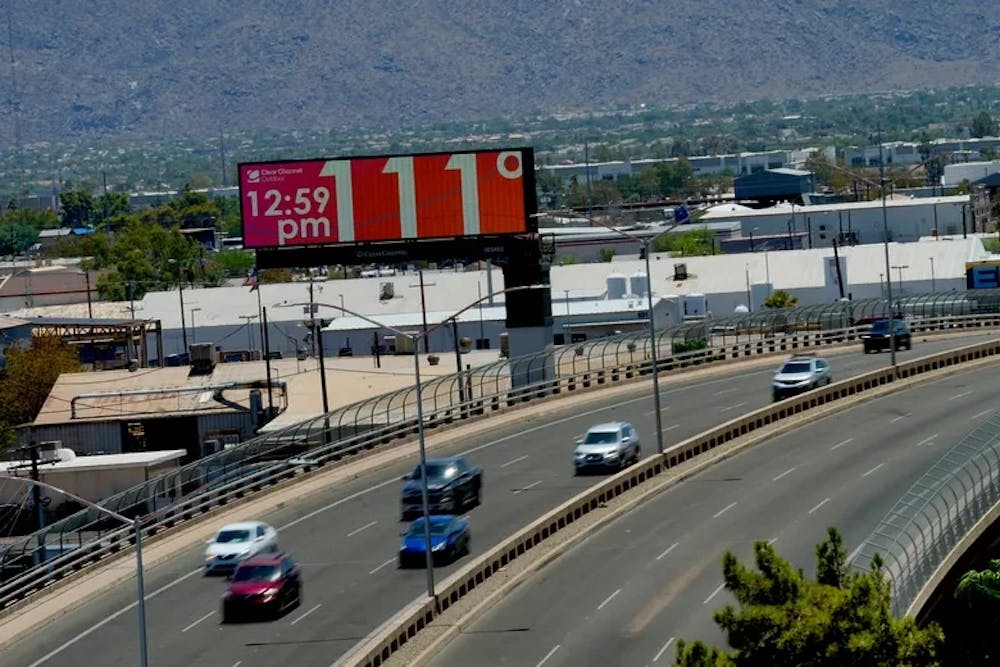With the summer months of June and July on the horizon, Maricopa County residents may face record breaking heat records in 2024.
According to the Arizona Climate State Office, July was the hottest month in Phoenix history in 2023 and the hottest month ever recorded in a U.S. city, averaging 102.7 degrees.
Phoenix native Stephanie Corella, a nurse practitioner at Valle del Sol, encourages people to stay informed about the weather.
Corella, who has experience working with in and out patients at Phoenix hospitals, has seen patients come in for heat-related illnesses during the summer.
“Organize your day so that your errands or tasks are completed during early mornings or late nights to avoid the hottest part of the day," said Corella.
Corella also highlighted the necessity of pre- and post-hydration during the summer months.
“Adding electrolytes to your drinks can help increase hydration, especially for individuals who are not getting enough fluids and water during the day,” Corella said.
Last year, Maricopa County broke a new record for heat-related deaths in 2023, increasing by 52% from last year's mark.
The annual report recorded by the Maricopa County Department of Public Health recorded 645 heat related deaths and found that 71% of those deaths were during extreme heat advisory days.
The DPH report included heat-caused deaths, where the primary cause of death is due to excess natural heat, and heat-related deaths, which include heat as a contributing factor in the death report.
Out of the 645 deaths, 59% of those deaths were caused by excessive heat exposure, and the remaining deaths involved heat as a contributing factor, the report said.
Residents who use public transportation to commute on a daily basis are exposed to the extreme heat conditions.
The Visit Phoenix website stated that the Valley Metro light rail train is air-conditioned but riders can see an average wait time of 15 to 20 minutes at its outdoor stations. Valley metro recommends using their mobile application when planning trips in the warm weather, according to their website.
Phoenix resident Kailash Ciaran depends on public transportation for his daily commute. Ciaran, who travels to downtown Phoenix and the Biltmore area through the bus transit system, remains aware of the summer heat when commuting.
“I’m not able to go to many places I’d like too simply because it is so much harder and more difficult,” Ciaran said. “If… I’m going to take the bus, I have to calculate how long I am going to be in the heat, which might be a long time.”
Organizations like The Salvation Army, have taken steps to contribute to the heat relief efforts and provide cooling stations at its facilities. The stations, located inside the multiple Salvation Army locations, provide water and a cool air-conditioned shelter to avoid the sun.
The Salvation Army has 11 cooling stations that are open from 11 a.m. to 5 p.m throughout the valley during excessive heat warning days, including weekend and federal holidays. At times, the organization will set up canopies outside its premises to provide water to passing individuals.
Lt. Colonel Ivan Wild of The Salvation Army Southwest Divisional Commander shared that most of the visitors at the heat relief stations are experiencing homelessness.
“We see people who are just walking outside during the normal course of their day stop in to cool off and get hydrated, sometimes even workers who have been out in the heat for several hours,” said Wild.
In order to prepare for heat-related illnesses and deaths, the Maricopa County DPH hired a Heat Relief Program Coordinator to “plan, organize, and coordinate heat relief efforts within the Heat Relief Network,” DPH records say.
The network is composed of heat relief centers throughout Maricopa in order to provide cooling for those affected by weather conditions, as well as a resource system for water and food for those in need.
Governor Katie Hobbs has also founded the Extreme Heat Preparedness Plan earlier this year and appointed a new Chief Heat Officer to prepare for extreme heat conditions in the future.

